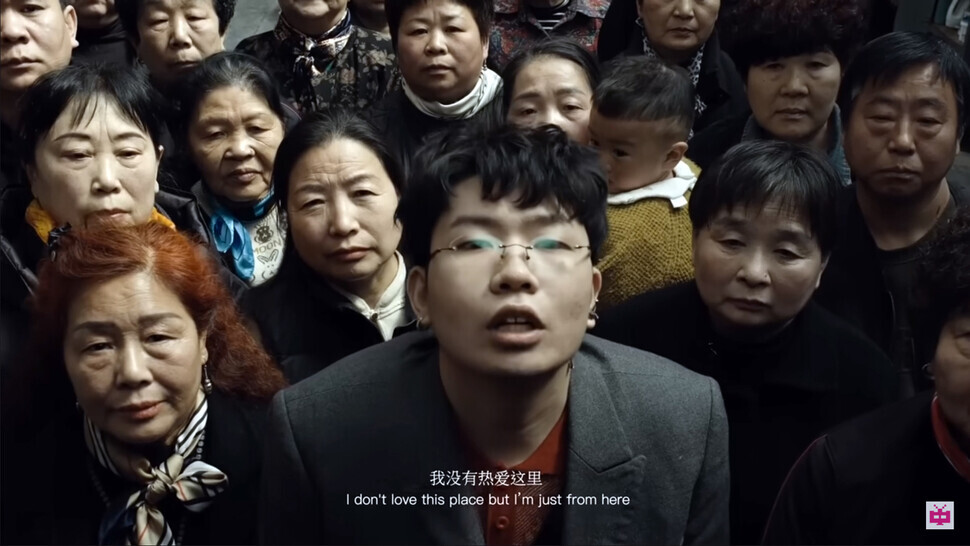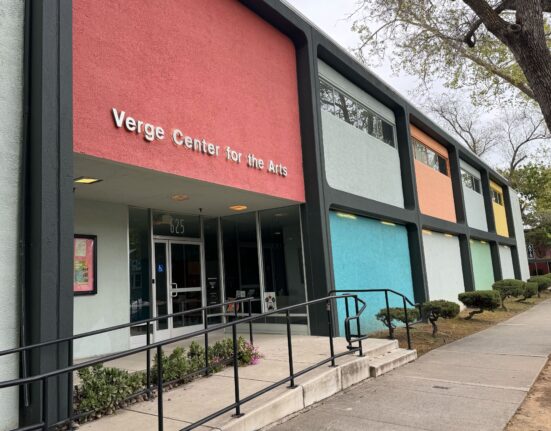
Still from Zhang Fangzhao’s music video “Factory.” (captured from YouTube)
“The smoke from the factories covers the stars. All villages are getting bought out for forced consolidations — the last holdouts are stuck like nails. The river water was dirty, even when I was a kid — now it has brought money but also disease. I was lucky to get out of that place. Nobody there has stories, and nobody wants to listen to them.” (from the song “Factory”)
On May 5, the music video for the song “Factory” was released on YouTube and Weibo. The song was written by Zhang Fangzhao, who calls himself the “God of Henan Rap.” The lyrics are honest and sentimental. Zhang represents his home region of Henan, telling the story of its rural residents who have been forced to undergo drastic transformations. The song rings true to the pain shared by people of similar background to Zhang.
Henan was ground zero for many of the political and social controversies that rocked China during the COVID-19 pandemic. Bank runs at four local banks in 2022 resulted in over 4,000 people holding months-long protests in front of government buildings. These protests lasted for months. In autumn of the same year, tens of thousands of workers at the Foxconn plant in the city of Zhengzhou fiercely resisted the government’s zero-COVID lockdowns. This is why many people refer to Henan as a microcosm of China’s greater economic and social issues.
“Unable to leave the city, unable to go back home”
Considering that Zhang was born in a small city in Henan Province and now lives in a big city, the rapper can also be regarded as a migrant peasant worker from the countryside. He’s one of the new generation of rappers drawing upon new wave and emo rap in the Chinese indie scene. Three years ago, he was selected as a “post-millennial wave” artist by NetEase Cloud Music, a Chinese music streaming service.
The music video for his newest track “Factory” went viral online in a matter of days. Both in terms of views and mentions, the song goes far beyond anything that this little-known rapper had been able to accomplish before.
In “Factory,” Zhang addresses the realities facing this new generation of peasant migrant workers in China. It’s hard for these workers to feel attached to their ailing hometown, and they struggle to make a living.
Zhang offers some words of consolation to the parents of new-generation migrant workers who blame themselves for not giving their children a better environment. “Mom, it’s not that simple a matter,” he says in the song, adding, “It’s certainly not rural people’s fault.”
After releasing the music video, Zhang wrote the following on his Weibo microblog account. “I dedicate this song to all the brothers and sisters who are in a similar situation to me.”
The song’s lyrics take a realistic approach to the hardship suffered by this new generation of migrant workers. For example, the line “People who can’t leave are stuck like a nail” suggests that people in the lower classes are trapped in poverty and can’t head off in search of a better environment.
Lu Tu, a sociologist who has studied this recent generation of migrant workers, summed up their predicament in the words, “They’re unable to leave the city, and they’re unable to go home.”
What exactly are the nails that keep young migrant workers down? The pollution belching from factory chimneys, the gloomy city streets, corporate exploitation in the form of low wages and long hours, and a political system that doesn’t allow people to express their anger at contradictions — their complex reality can’t be neatly expressed.
If we recall that historically speaking, the genre of rap was born in the Bronx slums as young people fought back against their daily struggles, it seems natural that this song would have been written by new-generation migrant workers who feel shackled to the old factory towns of Henan Province.
Zhang is not the only artist who has written about the predicament of this new generation of peasant migrants, known as “mingong.”
Xu Lizhi, from the city of Jieyang in Guangdong Province, was a member of that generation, just like the rest of his friends. As soon as he graduated high school, he moved to a big city where factory jobs were easy to come by. In February 2011, while Xu was 21 years old, he got a job at a Foxconn factory in Shenzhen and began working on an iPhone assembly line.
Xu worked 16-17 hours a day, just like many other workers. When the schedule was tight, he only got two days off a month. At the end of his three-year contract in February 2014, he left his job and worked for a time in Jiangsu Province. Then on Sept. 26, he signed another three-year contract with Foxconn. His employment contract listed a monthly wage of 1,900 renminbi, or about 330,000 won.
This kind of short-term contractual work will be familiar to many Koreans. That is what is meant by “labor flexibilization,” which is supported by people who think companies should have even more discretion over their workforce.
At 2 pm on Sept. 30, 2014, Xu Lizhi went up to the 17th floor of a building near the factory that was crammed with rental units and jumped off, ending his life at the age of 24. He spent all his 20s as a subcontract worker making iPhones, but he was also a poet. The poems he wrote began to gain attention after his death, and they’ve been featured in several television programs in China.
Here are a few lines from his poem “Looking Vaguely All Around”: “A few years ago / with his backpack on / he stepped on this spot / in high spirits / in this flourishing city. / A few years later / he stood at an intersection / in this city / clutching his own ashes.”
Songs removed, names banned from search engines
But even rappers and poets are limited in how much they can discuss, even indirectly, the oppressive aspects of life in China.
Indie musician Xie Yugang is another artist who complains about the restrictions on free expression in China. Given the extreme commercialization of the concert market, there are not nearly as many chances to meet audiences in small concerts as there used to be.
Xie talks about everyday oppression in his music. In a song called “Newly Built,” he said, “Treat your shame as bitter wine and blood.” And in “Flunkies,” he said, “We don’t offer a helping hand to filthy people, and we don’t pay any attention to neutered memories.”
Li Zhi may be the Chinese artist who is best known for having to set down the microphone because of state oppression. Li’s satirical lens on the state of affairs — singing in his best-known hit “People Need No Freedom” that “there’s never been a better time to be alive” — earned him popularity, until suddenly in April 2019 he cancelled all his shows and was gone without a trace.
That spring some 130 activists had been arrested one after the other. As of today, one won’t find Li’s music on any Chinese streaming platforms, as they’ve been deleted. His name has gone on the search query blacklist. It wasn’t until August of 2020 that he gave a public performance again, but by that point, he couldn’t even sing the song that made him famous.
Zhang, the rapper, faces his own hurdles. As soon as his new track became a viral bop, he went back and deleted all the posts on his Weibo account that were critical of society and posted a message asking that listeners refrain from litigating the deeper meaning of the lyrics in “Factory.” The God of Henan Rap appears to have opted for a tactical defense out of fears that, should his song touch off some sort of social ripple effect, he could find himself sanctioned by the authorities.
A line from “Factory” itself seems to betray this slippery gray area well: “I don’t love this place. I’m just from here.”
In rap and poetry, this new generation of peasant migrants in China continues its minor acts of disobedience.
By Hong Myung-kyo, activist and researcher of East Asia
Please direct questions or comments to [english@hani.co.kr]






